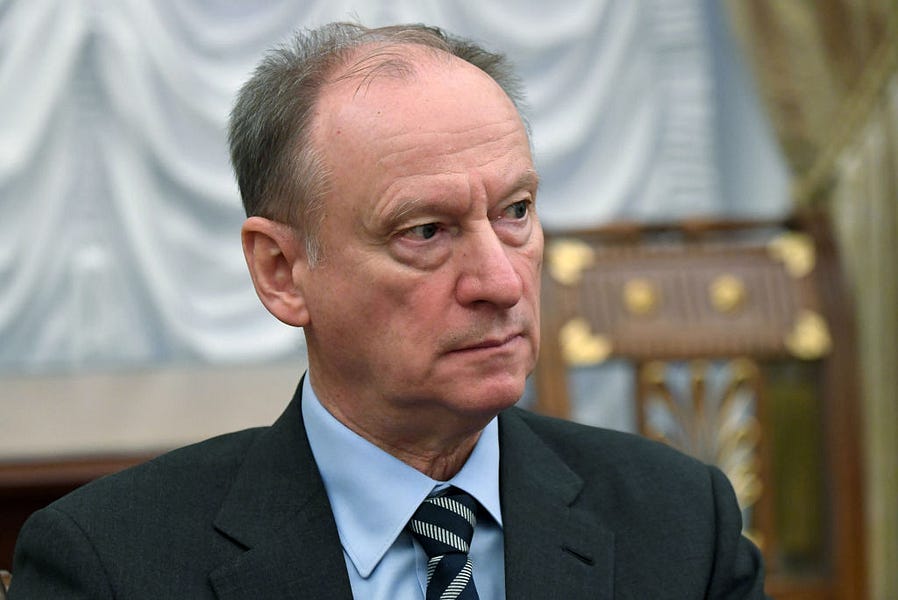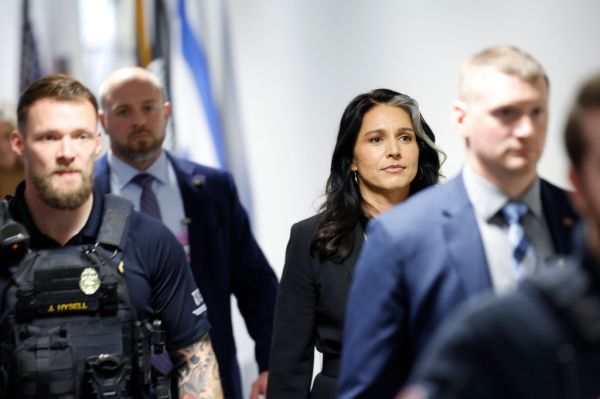As Russian troops massed on the Ukrainian border in November and U.S. military and intelligence officials grew increasingly concerned about the possibility of a Russian invasion of Ukraine, National Security Adviser Jake Sullivan phoned Gen. Nikolai Patrushev, the secretary of the national security council of Russia.
Sullivan speaks regularly with his Russian counterpart. Between the end of January and November 19, they were on the phone seven times. According to the New York Times, the reason for these chats—as well as for today’s scheduled “conversation” between Presidents Biden and Putin—is the administration’s belief that “more direct talks” are necessary to “further understand Moscow’s intentions.”
It’s not entirely inconceivable that Patrushev might have come clean about the Kremlin’s plans for Ukraine. Yet given his nearly half-century in the KGB and its successor, the FSB (including a nine-year stint as the secret service director, when he succeeded Putin in 1999), truth-telling is not likely to be among his strong suits.
So in their future chats, Sullivan might want to supplement whatever his Russian counterpart does tell him with a historically proven insight into Patrushev’s thinking. Like the top officials of the Soviet Union to which Putin and those closest to him remain unabashedly loyal (Patrushev refers to Stalin’s Soviet Union as “our country” and labels Truman and Reagan “Russophobes”), what Kremlin occupants tell the Russian people has always been a far more reliable guide to their perceptions and beliefs than what they’ve disclosed to their foreign interlocutors. And since someone of Patrushev’s bureaucratic acumen would never utter a word that the boss would not approve of, what he says reflects Vladimir Putin’s own opinions.
So what are the U.S. and its allies up to these days, according to Patrushev? The U.S. “geopolitical strategy,” he explains, is to preserve hegemony while “beggaring the entire world.” America’s NATO allies are not excepted from the abuse, either. According to Patrushev, NATO’s official goal is to “constrain” Russia, but when the Americans pressure Europeans to increase their military budgets, Patrushev asks, isn’t obvious that their goal is to constrain the development of “Germany, France, Italy and other European states” by burdening them with ruinous defense expenditures? And the objective of programs such as the “Partnership for Peace” for future NATO members is similar: to prevent sovereign countries from “raising their heads,” rather than pursuing policies that benefit their development.
Look at American behavior in World War II, Patrushev says. All that Britain got from Washington, he claims, was 50 rusty destroyers, which Americans were ready to scrap—in exchange for tens of military bases in British colonies. (It is true that FDR did provide obsolete ships to the U.K. in 1940 while limited by the Neutrality Act of 1939. However the U.S. ultimately delivered $50 billion in aid—$941 billion adjusted for inflation—to Allied partners during the course of the war through the Lend-Lease program. For additional context, total real GDP for that time comes out to $10.3 trillion, adjusted for inflation.)
And that included aid to the Soviet Union. How to explain that? Soviet diplomats used it as a peace offering, a prelude to “thaws” and détentes. Whatever else they told their people about the U.S., neither Stalin nor post-Stalin Soviet leaders ever denied U.S. assistance. Until Gorbachev, war veterans all, they were there when America moved and fed the Red Army with hundreds of thousands of jeeps and trucks, thousands of tanks, and millions of tons of oil and food.
But Patrushev, unlike his Soviet predecessors, does not acknowledge the shared U.S.-Soviet past. For him it simply does not exist. The same is true for Putin. At this year’s May 9 Victory Day parade, he confirmed: “Our people were alone on the arduous, heroic and sacrificial path to Victory.”
Today, too, while Russia is “actively helping” other countries to fight COVID, America “is showing egotism,” according to Patrushev. And he suggests there is more to the U.S. behavior than selfishness. Bio labs under American control are springing up all over the world, Patrushev alleges, mostly along the borders of Russia and China. Ostensibly, American scientists are helping the locals to fight dangerous illnesses. Except, he adds, the authorities of those countries have no idea what is happening within the walls of those labs.
Russians are told that these medical centers on their borders are peaceful epidemiological stations but they look more like Fort Detrick in Maryland where, Patrushev says, Americans have worked on weaponized biology for decades. (The Associated Press reported in 2018 that these claims of a “network of labs” are based off a lab owned and operated by the Georgian CDC that is partially funded by the U.S.) “Do you mean they are developing biological weapons there?” a reporter at the national security adviser of the top Russian business newspaper Kommersant asked. “We have solid reasons to believe this is the case,” Patrushev answered.
Eleven days after Sullivan and Patrushev last spoke, the White House convened an emergency meeting of NATO foreign ministers in Riga, Latvia, both to discuss what Russia may do and consider responses to the continuing Russian deployment on the Ukrainian border. So perhaps Sullivan will call Patrushev soon again to learn about Russia’s “intentions.”
In the meantime, it is helpful to know the place where these purposes originate. Milton put it well in Paradise Lost: “For never can true reconcilement grow/ Where wounds of deadly hate have pierced so deep.”
Leon Aron is a senior fellow at the American Enterprise Institute.








Please note that we at The Dispatch hold ourselves, our work, and our commenters to a higher standard than other places on the internet. We welcome comments that foster genuine debate or discussion—including comments critical of us or our work—but responses that include ad hominem attacks on fellow Dispatch members or are intended to stoke fear and anger may be moderated.
You are currently using a limited time guest pass and do not have access to commenting. Consider subscribing to join the conversation.
With your membership, you only have the ability to comment on The Morning Dispatch articles. Consider upgrading to join the conversation everywhere.